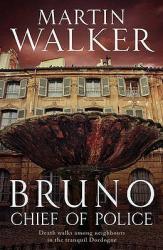
The first installment in a wonderful new series that follows the exploits of Benoît Courrèges, a policeman in a small French village where the rituals of the café still rule. Bruno -- as he is affectionately nicknamed -- may be the town's only municipal policeman, but in the hearts and minds of its denizens, he is chief of police.
Bruno is a former soldier who has embraced the pleasures and slow rhythms of country life -- living in his restored shepherd's cottage; patronizing the weekly market; sparring with, and basically ignoring, the European Union bureaucrats from Brussels. He has a gun but never wears it; he has the power to arrest but never uses it. But then the murder of an elderly North African who fought in the French army changes everything and galvanizes Bruno's attention: the man was found with a swastika carved into his chest.
Because of the case's potential political ramifications, a young policewoman is sent from Paris to aid Bruno with his investigation. The two immediately suspect militants from the anti-immigrant National Front, but when a visiting scholar helps to untangle the dead man's past, Bruno's suspicions turn toward a more complex motive. His investigation draws him into one of the darkest chapters of French history -- World War II, a time of terror and betrayal that set brother against brother. Bruno soon discovers that even his seemingly perfect corner of la belle France is not exempt from that period's sinister legacy.
Bruno Chief of Police, Martin Walker
If you're not a fan of cosy style mysteries, you could be forgiven for missing BRUNO CHIEF OF POLICE. Don't be fooled by the cover photos, or the blurb which uses a comparison with a rather well known cosy writer though. BRUNO CHIEF OF POLICE is much more of a police procedural. Well it's a rural French procedural, so whilst there's a violent murder to be solved, there's also a very engaging central police character, a great sense of place, and meals to die for. Perhaps a comparison with Montalbano might have been more successful? Although it's still not quite accurate as Bruno is considerably more content and able to deal with life, his colleagues and the various challenges along the way (like matchmaking local women) with a lot more joie de vivre than you could ever imagine Montalbano contemplating.
Mind you, the story does it's bit to mislead the reader at the beginning, as Bruno seems to be mostly occupied with stopping the locals from wreaking havoc on the EU Hygiene Inspection officer's as they clamp down on the local farmers market. Luckily that's not exactly a full time occupation for a local Chief of Police, so he's got plenty of time in which to attend to his own vegetables and poultry, make his own liqueur and potter around building his house. The story behind how Bruno ended up Chief of Police of St Denis is a tale in its own right, but Bruno's background, the story of the village and the occupants and its extremely important history and culture are built into the investigation of a shocking murder in a way that is seamless, charming and involving. When the idyllic village lifestyle is shattered by the discovery of the body of an old man, head of a local immigrant North African family, dead, eviscerated, his body mutilated with the image of a swastika, the multi-levelled police system in France means that outsiders take responsibility for the investigation. They are more than happy to suspect two local rich kids, on the fringe of a drug trafficking neo-Nazi group. Local knowledge leads Bruno to something from the past that has surfaced at last.
Bruno is simply a wonderful character. Astute, yet relaxed, alone but self-sufficient, he's a believable village copper with a lifestyle that is highly desirable. The village is nicely populated with its own brand of eccentrics, the old residents and the new arrivals. Whilst the tensions in that little town in the middle of a big rural area reflect the sorts of tensions that you get in any society, there's the added complications of a country, and people, who remember the Second World War all too clearly.
The only worrying thing is that for this series to continue, and continue it hopefully will, St Denis could run the risk of becoming as dangerous a place as St Mary Mead, Midsomer or Denton. Let's hope there's enough vin de noix to keep Bruno's spirits up.